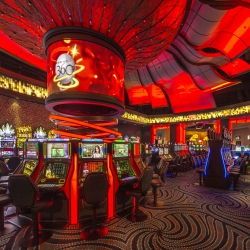The American Gaming Association released an economic impact report on the tribal casino industry in the United States. The AGA, which represents the $240 billion US casino industry, including both commercial and Native American casino operators and their suppliers, called its report the first-ever state-by-state breakdown analysis of the complete impact of Native American gambling operations and the effects it on the US economy.
American tribal gaming generates $96.6 billion in total economic output. In doing so, it represents over 40% of the US gambling economy and over and creates 35% of the country’s 1.7 million jobs in the gambling sector.
The report is a nod to the growing influence of tribal gaming, which now supports its own cottage industries in the Class II gaming machine sector. The AGA has included more tribal gaming executives on the AGA’s board of directors in recent years, including Felix Rappaport of Foxwoods Resort Casino, Loren Gill of the San Manuel Band of Mission Indians, Mark Fulton of Cherokee Nation Entertainment, and Juan Rico of The Chickasaw Nation.
Native American Casinos’ Economic Impact
Alan Meister, a professor at California Irvine, authored the report, which discussed the degree of impact tribal gaming has had on the entire industry in the US. Professor Meister, an economist specializing in the application of economic analysis to economic development and business operations matters, has written extensively on the US gaming industry.
There are 565 Native American tibes in the United States, but only 244 of those tribes run gambling operations. The tribal gaming authorities have more than 485 Indian gaming operations in 28 US states. Tribal gaming has created over 635,000 full time jobs and pays $33.2 billion in annual wages.
The Commission’s study found that tribal gaming accounts for $16 billion in taxes and is responsible for direct payments to governments at the state and local level. These tax revenues inevitably benefit public services and support reservation communities.
In the report, Alan Meister notes, “Since the passage of the Indian Gaming Regulatory Act (IGRA) in 1988, tribal gaming has grown 300-fold from a $121 million segment of the U.S. gaming industry, consisting of small bingo halls and gaming facilities, to a $30 billion-plus segment in 28 states.”
Community Partner in Oklahoma
Geoff Freeman, president and chief executive officer of the AGA mentioned that, “Casino gaming is a strong community partner throughout Oklahoma and across the 40 states where our industry operates.”
The AGA president added, “As tribal and commercial operators continue to work together, our industry will continue to grow in the years to come.”
AGA’s Small Business Jobs Tour
The report was released last Tuesday, during the AGA’s American Gaming Small Business Jobs Tour in Oklahoma, a bastion of tribal gaming. In attendance were two of Oklahoma’s US representatives, US Rep. Tom Cole (R) and US Rep. Markwayne Mullin (R). The congressmen appeared along with representatives of Oklahoma’s booming tribal gaming industry, which includes 126 gaming facilities owned and operated by 31 tribes.
Those members included Matthew Morgan of the Chickasaw Nation, Mark Fulton of Cherokee Nation Entertainment, Sheila Morago of the Oklahoma Indian Gaming Association, Stevens C. Agee of the Economic Research and Policy Institute (ERPI), and Russell Evans of OSU and the Meinders School of Business at Oklahoma City.
Markwayne Mullin on Tribal Gaming
Congressman Markwayne Mullin, who represents the state’s second congressional district, discussed the generous efforts of gaming tribes in his district and the positive impact they have on local communities.
Rep. Mullin said he felt that local benefit of the tribes should be mentioned more, “I’ll be the first one to tell you, I didn’t know about it. I didn’t understand how much they were investing in our communities until I got into office.”
US Tribal Gaming by State
Second only to California, Oklahoma is responsible for a considerable portion of America’s tribal gaming industry. Oklahoma casinos have generated $8.7 billion in economic output, 66,000 jobs, $3.6 billion in wages, and $2.2 billion in tax revenues.
Oklahoma and California have the largest state tribal gaming economy in the U.S. In terms of economic output, the next largest states include Florida at $5.7 billion, Washington at $5 billion and Arizona at $4.5 billion.
Russell Evens on Oklahoma Gaming Tribes
Because Oklahoma is a less prosperous US state, the tribal gaming tax revenues contribute significantly to state and local governments. Russell Evans, executive director of the Stevens C. Agee Economic Research and Policy Institute at Oklahoma State University, said, “[Gaming] is a significant driver of economic activity, particularly in areas in the state where economic opportunity is difficult to find right now.”
Oklahoma has a large Native American population, because it was a destination for many of the tribes removed from east of the Mississippi River by the US federal government, in the Trail of Tears era and subsequent forced migrations. Many Indian reservations in Oklahoma have been traditionally depressed areas, so the 1988 Indian Gaming Act was a boon to local tribes.
Professor Evans added, “It is estimated that casino operations and related activities in Oklahoma generate, just as a first layer of business-to-business impacts, $593 million….Those economic activities, of course form, an important tax base generating nearly $33m in income taxes for the state.”

